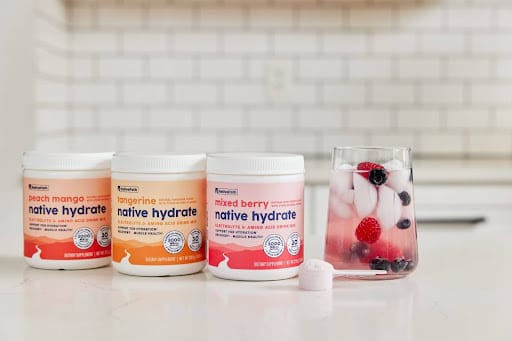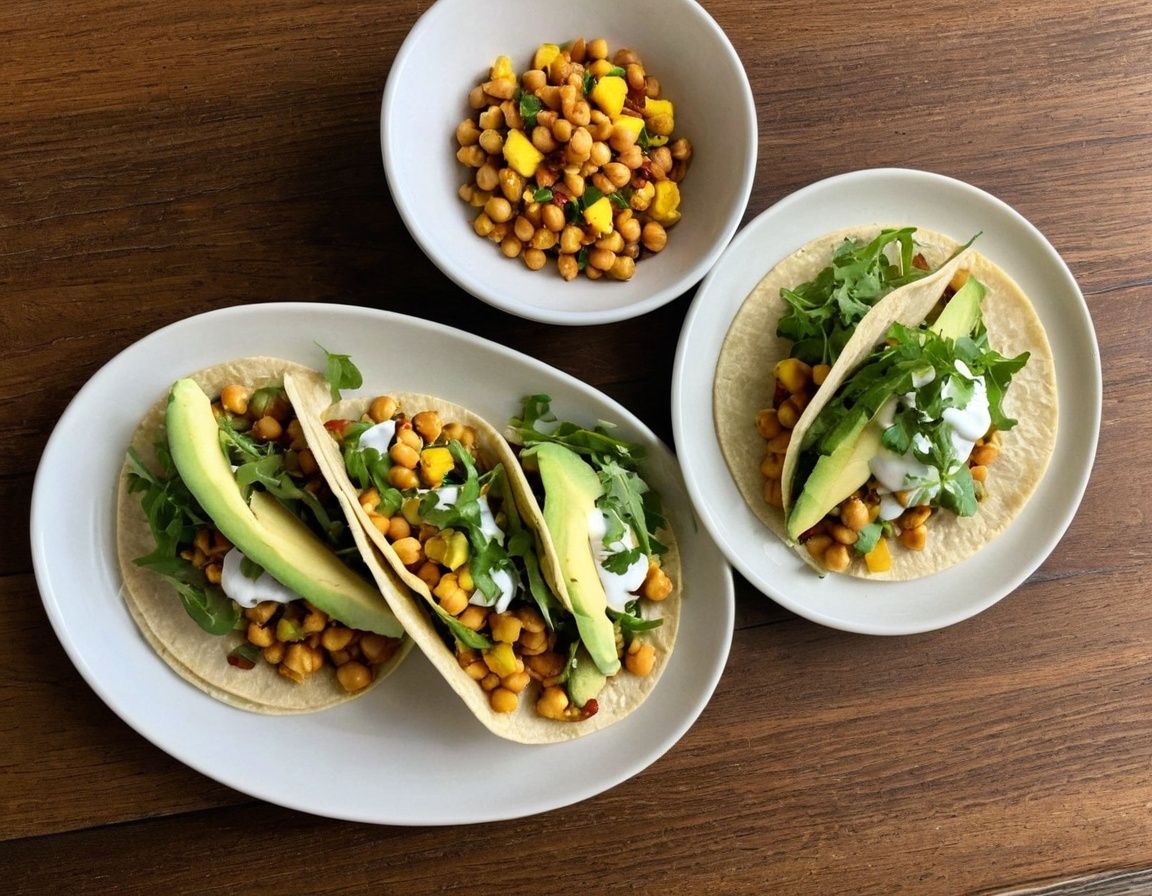What’s your weakest area of health? For example, diet? Exercise? Sleep? Mental health? Something else? Find one thing today that you can do to improve that weakest area, and do it!
In A Rush?
Today’s 30-Second Summary
If you don’t have time to read the whole email today, here are some key takeaways:
Qigong has been practiced for health reasons for a very long time, but what does modern science have to say about it?
Today’s main feature examines the challenges with regard to testing it against placebo, and the evidence-based benefits that can be derived in measurable ways.
How’s your hydration looking today? For most people, at any given time, it’s not great. But it doesn’t have to be that way!
Today's sponsor NativePath is offering a 365-day money-back guarantee on their range of electrolyte and amino acid drink mixes, which are great for your kidneys, bladder, and pelvic floor muscles.
Today’s featured recipe is for toasted chick’n mango tacos; great for your gut, heart, blood sugars, and more!
Read on to learn more about these things, or click here to visit our archive
A Word To The Wise
Twice Daily? Daily? Weekly? Never?
How often should you weigh yourself, really? Different approaches may suit different people:
Watch and Learn
What Too Much Exercise Does To Your Body And Brain
"Get more exercise" is a common rallying-cry for good health, but it is possible to overdo it. And, this is not just a matter of extreme cases of "exercise addiction", but even going much above certain limits can already result in sabotaging one's healthy gains. But how, and where does the line get drawn?
Prefer text? The above video will take you to a 10almonds page with a text-overview, as well as the video!
Mythbusting Friday
Qigong: Breathing Is Good (Magic Remains Unverified)

In Tuesday’s newsletter, we asked you for your opinions of qigong, and got the above-depicted, below-described, set of responses:
About 55% said “Qigong is just breathing, but breathing exercises are good for the health”
About 41% said “Qigong helps regulate our qi and thus imbue us with healthy vitality”
One (1) person said “Qigong is a mystical waste of time and any benefits are just placebo”
The sample size was a little low for this one, but the results were quite clearly favorable, one way or another.
So what does the science say?
Qigong is just breathing: True or False?
True or False, depending on how we want to define it—because qigong ranges in its presentation from indeed “just breathing exercises”, to “breathing exercises with visualization” to “special breathing exercises with visualization that have to be exactly this way, with these hand and sometimes body movements also, which also must be just right”, to far more complex definitions that involve qi by various mystical definitions, and/or an appeal to a scientific analog of qi; often some kind of bioelectrical field or such.
There is, it must be said, no good quality evidence for the existence of qi.
Writer’s note, lest 41% of you want my head now: I’ve been practicing qigong and related arts for about 30 years and find such to be of great merit. This personal experience and understanding does not, however, change the state of affairs when it comes to the availability (or rather, the lack) of high quality clinical evidence to point to.
Which is not to say there is no clinical evidence, for example:
…found that qigong indeed increased meridian electrical conductance!
Except… Electrical conductance is measured with galvanic skin responses, which increase with sweat. But don’t worry, to control for that, they asked participants to dry themselves with a towel. Unfortunately, this overlooks the fact that a) more sweat can come where that came from, because the body will continue until it is satisfied of adequate homeostasis, and b) drying oneself with a towel will remove the moisture better than it’ll remove the salts from the skin—bearing in mind that it’s mostly the salts, rather than the moisture itself, that improve the conductivity (pure distilled water does conduct electricity, but not very well).
In other words, this was shoddy methodology. How did it pass peer review? Well, here’s an insight into that journal’s peer review process…
❝The peer-review system of EBCAM is farcical: potential authors who send their submissions to EBCAM are invited to suggest their preferred reviewers who subsequently are almost invariably appointed to do the job. It goes without saying that such a system is prone to all sorts of serious failures; in fact, this is not peer-review at all, in my opinion, it is an unethical sham.❞
One of the other key problems is: how does one test qigong against placebo?
Scientists have looked into this question, and their answers have thus far been unsatisfying, and generally to the tune of the true-but-unhelpful statement that “future research needs to be better”:
Problems of scientific methodology related to placebo control in Qigong studies: A systematic review
Most studies into qigong are interventional studies, that is to say, they measure people’s metrics (for example, blood pressure, heart rate, maybe immune function biomarkers, sleep quality metrics of various kinds, subjective reports of stress levels, physical biomarkers of stress levels, things like that), then do a course of qigong (perhaps 6 weeks, for example), then measure them again, and see if the course of qigong improved things.
This almost always results in an improvement when looking at the before-and-after, but it says nothing for whether the benefits were purely placebo.
We did find one study that claimed to be placebo-controlled:
…but upon reading the paper itself carefully, it turned out that while the experimental group did qigong, the control group did a reading exercise. Which is… Saying how well qigong performs vs reading (qigong did outperform reading, for the record), but nothing for how well it performs vs placebo, because reading isn’t a remotely credible placebo.
See also: Placebo Effect: Making Things Work Since… Well, A Very Long Time Ago ← this one explains a lot about how placebo effect does work
Qigong is a mystical waste of time: True or False?
False! This one we can answer easily. Interventional studies invariably find it does help, and the fact remains that even if placebo is its primary mechanism of action, it is of benefit and therefore not a waste of time.
Which is not to say that placebo is its only, or even necessarily primary, mechanism of action.
Even from a purely empirical evidence-based medicine point of view, qigong is at the very least breathing exercises plus (usually) some low-impact body movement. Those are already two things that can be looked at, mechanistic processes pointed to, and declarations confidently made of “this is an activity that’s beneficial for health”.
See for example:
…and those are all from respectable journals with meaningful peer review processes.
None of them are placebo-controlled, because there is no real option of “and group B will only be tricked into believing they are doing deep breathing exercises with low-impact movements”; that’s impossible.
But! They each show how doing qigong reliably outperforms not doing qigong for various measurable metrics of health.
And, we chose examples with physical symptoms and where possible empirically measurable outcomes (such as COVID-19 infection levels, or inflammatory responses); there are reams of studies showings qigong improves purely subjective wellbeing—but the latter could probably be claimed for any enjoyable activity, whereas changes in inflammatory biomarkers, not such much.
In short: for most people, it indeed reliably helps with many things. And importantly, it has no particular risks associated with it, and it’s almost universally framed as a complementary therapy rather than an alternative therapy.
This is critical, because it means that whereas someone may hold off on taking evidence-based medicines while trying out (for example) homeopathy, few people are likely to hold off on other treatments while trying out qigong—since it’s being viewed as a helper rather than a Hail-Mary.
Want to read more about qigong?
Here’s the NIH’s National Center for Complementary and Integrative Health has to say. It cites a lot of poor quality science, but it does mention when the science it’s citing is of poor quality, and over all gives quite a rounded view:
Enjoy!
Our Sponsors Make This Publication Possible
Don't drink more... Drink smarter!
You've probably heard that the human body is about 60% water.
That was true... In our 20s, anyway. By the age of 50, the average is more like 51.5%, and that number continues to drop as we get older.
But it doesn't have to be that way.
NativePath is offering an optimized blend of electrolytes and amino acids, that has been shown to reduce UTIs by 58%, improve muscle strength by 36%, and yes, that includes strengthening the bladder!
In short: you don't have to drink more, if you drink smarter.
Best of all, there's a 365-day money-back guarantee, so there's no reason not to try it out and see if you like it:
Please do visit our sponsors—they help keep 10almonds free
This Or That?
Vote on Which is Healthier
Yesterday we asked you to choose between banana bread and bagel—we picked the bagel (click here to read about why), as did only 27% of you!
Now for today’s choice:
Click on whichever you think is better for you!
Recipes Worth Sharing
Toasted Chick’n Mango Tacos
Tacos aren’t generally held up as the world’s healthiest food, but they can be! There’s so much going on in this dish today, healthwise, in a good way, that it’s hard to know where to start. But suffice it to say, these tacos are great for your gut, heart, blood sugars, and more:
Click below for our full recipe, and learn its secrets:
Penny For Your Thoughts?
What did you think of today's newsletter?
Take a deep breath—the weekend is nearly here! May today see you well-prepared for it,
The 10almonds Team








